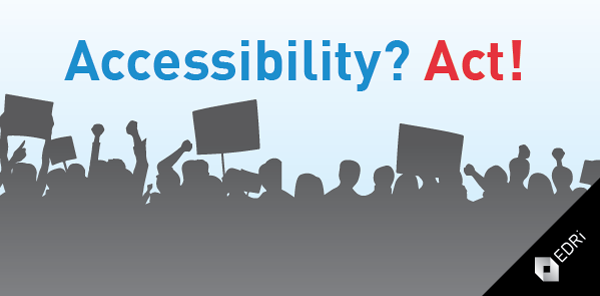People with disabilities do not want just any Accessibility Act
On 6 March 2017, the European Disability Forum (EDF), the umbrella organisation representing persons with disabilities at EU level, joined forces with its members and other civil society organisations to protest in front of the European Parliament in Brussels. Over a hundred people gathered together calling for a meaningful European Accessibility Act (EAA), to guarantee better accessibility to services, including online services, for everyone.
The organisation of this demonstration, as well as the publication of an open letter to Members of the European Parliament (MEPs), was triggered by the initial draft report of the European Parliament Committee on the Internal Market and Consumer Protection (IMCO). The draft did not meet the expectations of 80 million persons with disabilities in Europe who still face barriers in their everyday life. Afterwards, inside the Parliament, the discussion in IMCO was more positive on the issues raised by the disability activists than had previously been the case.
Accessibility is a human right enshrined in the United Nations Convention on the Rights of Persons with Disabilities. It has been ratified by the EU and 27 of its Member States. Accessibility is also a pre-condition to be able to enjoy other fundamental rights, participate in all aspects of our societies and live independently. In practice, many daily errands, such as withdrawing money from a cash machine, using a computer and accessing online services, calling a friend or watching TV are impossible for many people.
In 2015, the European Commission presented the long-awaited Accessibility Act, the proposal for a Directive harmonising accessibility requirements for a set of mainstream products and services within the EU internal market. The Act has a very strong information and communications technology (ICT) component, including computers and operating systems, smartphones, TVs, e-books, e-commerce, self-service terminals and ATMs, e-banking services, telephony and audiovisual services.
The IMCO Committee draft report suggested deleting some of the accessibility requirements, especially for ICT products and services. It replaced them by more general functional performance criteria, which do not recognise the peculiarities of the different products and services. Some products and services, such as the ones regarding web accessibility, can share some requirements. However, certain products and services need more specific requirements. For example, the requirements for TVs should include the possibility to enable audio description to allow visually impaired people to access the contents. In contrast, the requirements for telephony services should ensure real-time text, to give hearing impaired people the possibility to use the services.

Being too vague in the accessibility requirements could lead to situations in which improvements are required, but they are not sufficient to fulfill the users’ needs. For example, enabling a “better use of limited vision” can mean simply enlarging the font size by one point, which is not necessarily sufficient. Companies should be allowed to come up with innovative solutions, but in order to serve its purpose, legislation should be comprehensive, clear, and detailed.
To make sure that persons with disabilities are not left behind in the battle for our digital rights, equal access to online contents and services for everyone should be one of the very first priorities for the EU.
Activists demonstrate for a strong law on accessibility in Europe
http://www.edf-feph.org/newsroom/news/activists-demonstrate-strong-law-accessibility-europe
Open letter to Members of the European Parliament concerning the European Accessibility Act
http://www.edf-feph.org/newsroom/news/open-letter-members-european-parliament-concerning-european-accessibility-act
United Nations Convention on the Rights of Persons with Disabilities
http://www.ohchr.org/EN/HRBodies/CRPD/Pages/ConventionRightsPersonsWithDisabilities.aspx#9
European Accessibility Act
http://ec.europa.eu/social/main.jsp?catId=1202
US Access Board: Information and Communication Technology (ICT) Final Standards and Guidelines
https://www.access-board.gov/guidelines-and-standards/communications-and-it/about-the-ict-refresh
(Contribution by Alejandro Moledo, European Disability Forum)



